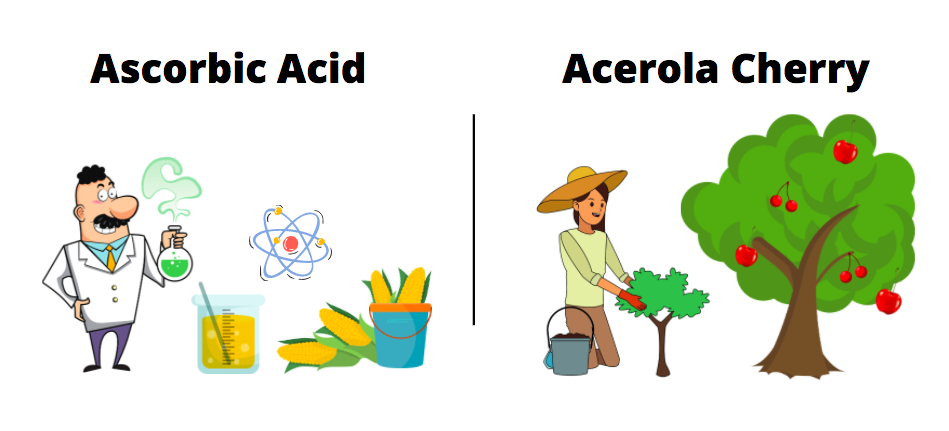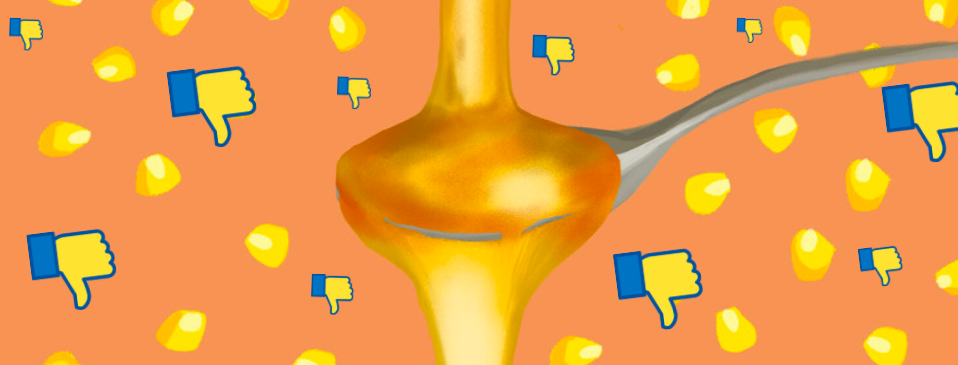You may know Vitamin C as an all-mighty vitamin—and you’re right—but the type you’re getting is probably wrong. What most don’t know is that vitamin C comes in many forms from ascorbic acid to acerola cherry and the type you’re consuming is most likely garbage. Let’s take a look at the good (acerola cherry), the bad (ascorbic acid), and the ugly (truth) on ascorbic acid vs acerola cherry.
Why? Over 90% of vitamin C you find in supplements and added to foods (from orange juice to fortified cereals) is ascorbic acid. So what’s wrong with ascorbic acid? It’s created from fermented corn syrup and it does not naturally contain vitamin C.
You read that right. Ascorbic acid is made from corn syrup. And corn syrup does not naturally contain vitamin C. However, scientists found a way to manipulate corn syrup in a lab using acetone, causing a reaction …and that widely-used “vitamin C” that’s in your daily vitamin.
To reap the incredible benefits of vitamin C, you need to choose vitamin C from sources where it naturally occurs. This is where Acerola cherry comes in *cue the applause*
Production: Ascorbic Acid vs Acerola Cherry

| Ascorbic Acid | Acerola Cherry | |
| Made From | Corn syrup (fermented) | Brazilian cherries |
| Production | Synthetically engineered | Farming |
| Natural Vitamin C-Levels | Does not naturally contain Vitamin C | Naturally Vitamin C-Dense |
| Origin | Most commonly China | Most commonly Brazil |
When comparing ascorbic acid vs acerola cherry in terms of vitamin C, there’s no comparison. Ascorbic acid is almost always synthetically produced from corn syrup. Given that corn syrup does not naturally contain vitamin C, it is genetically modified using acetone (yes – the same stuff in nail polish remover). This very scientific (and very magical) process causes a chemical reaction that creates vitamin C.
In other words, ascorbic acid is made from genetically modified corn syrup. If that wasn’t concerning enough, its almost always produced in China. This means we are unable to regulate what goes in it as it doesn’t have to abide by U.S. FDA food safety laws.
Now let me introduce to you: acerola cherry. Acerola cherry is a super fruit that naturally grows in Brazil and it’s used for vitamin C given its high, naturally occurring levels.
Learn more about synthetic ascorbic acid.
Side Effects of Ascorbic Acid Vitamin C

Vitamin C in high doses can do some damage. From kidney stones to heartburn, there are a number of side effects from consuming a lot of ascorbic acid.
Here are the most common side effects of excess Vitamin C (as ascorbic acid):
- Kidney stones
- Headaches
- Diarrhea
- Vomiting
- Abdominal cramps
- Heartburn
Keep in mind these are the side effects of vitamin C from ascorbic acid. It’s not surprising a vitamin created in a lab would have adverse effects.
Benefits of Vitamin C (Acerola cherry)

Where to start!? Vitamin C is so good for you and in so many ways. You may be most familiar with the benefits of vitamin C in terms of your immune system, which can help your body naturally fight off germs and viruses, but it also does so many other things. From skin health to improving memory and decreasing your risk of heart disease, vitamin C is a powerful vitamin that everyone can benefit from.
- Boost your immune system
- Studies show it may help prevent some types of cancer
- May help aid in the treatment of some types of cancer
- Improve skin elasticity
- Heal wounds
- Fight inflammation naturally
- Helps to manage high blood pressure
- Decrease your risk of heart disease (the leading cause of death in the U.S.)
- Increased memory
- Anti-aging properties
Learn more about the general health benefits of vitamin C, or check out why high-dose vitamin C kills cancer cells according to a study from Science Daily.https://www.youtube.com/embed/RBMnRmbNMr0?feature=oembedhttps://www.youtube.com/embed/OjkzfeJz66o?feature=oembed
Ways to Get Acerola Cherry Vitamin C
What’s great about acerola cherry vitamin c is how many forms it comes in. There are easy-to-swallow capsules if you’re the type that wants a fast way of taking it. Powder if you’re into whipping up super healthy smoothies and bowls. Last but not least, there are even wafers if you happen to dislike swallowing pills, but also aren’t into smoothies.
- Capsule: Peak Performance Raw Wholefood Vitamin C Acerola Cherry (90 capsules, $16.95)
- Powder: Pure Acerola Cherry Powder Organic (8oz., $24)
- Chewable wafers: American Health Super Acerola (100 wafers, $15)
- Multivitamin for Women: Whole Earth & Sea Multivitamin and Minerals (30 servings, $30)
- Multivtimin for Men: Whole Earth & Sea Multivtimin and Minerals (30 servings, $30)
If you’re taking a daily multivitamin, the best way to get your daily dose of acerola cherry is to choose a multi that includes acerola as its form of Vitamin C. Every multi is going to include some form of Vitamin C anyway, so you might as well choose a high-quality vitamin that includes high-quality ingredients, such as acerola. When choosing a multi, be wary as there are a number of products that claim to have acerola cherry, but actually contain a combination of Vitamin C types, with no information on how much of each type is included. The best multivitamin is Whole Earth & Sea, which isn’t the cheapest, but it is the best–so while it costs more than alternatives, it is more effective and thus isn’t throwing your money in the garbage.
Frequently Asked Questions (FAQs)
How much vitamin C should I take in a day?
The recommended daily amount of vitamin C for the average adult looking to stay healthy is around 75 to 100mg. Pregnant women are advised to take more, at around 120mg per day. However, vitamin C is water-soluble, meaning you can’t really get too much (without going wildly overboard). Instead, your body will release excess vitamin C through urination.
Do vitamin C skincare products work?
Vitamin C has been proven to be an effective skincare treatment. However, not all products touting vitamin C on their label are effective. Many simply use it as a marketing tool and actually contain little to no vitamin C. The most powerful vitamin C skincare product for anti-aging is Glycolic Acid, which is basically a super-strong version of vitamin C. It’s used as an acid peel to help treat acne-prone skin as well as to reduce fine lines.
What are other ways I can eat to stay healthy?
Food should be your medicine, not the other way around. If you want to be healthy, eat healthy. In general, eat as many real foods as possible. And by real, I mean foods that are not made by a manufacturer, but a farmer. Eat smaller portions, cut back on sugar and carbs, and overall take a more old-world approach to our diet and how we consume foods. To learn more, check out these tips on how to eat like an Italian to be healthy.
Why do some say vitamin C doesn’t help with cancer?
Despite many studies and general common sense, the idea that vitamin C can help prevent and treat cancer is widely disputed. You have to ask yourself who is disputing it, and what is their stake in disputing it? Cancer treatments are a billion-dollar industry. It’s not new that those profiting off treatments (which often also do not work), would be fear a very affordable and low-risk cancer treatment.
You also have to consider that cancer is an umbrella term. There are so many different types of cancer and of course, there’s no one-size-fits-all types of cancers. It makes sense that vitamin C wouldn’t work for all cancers, but when many have tried it with success, it’s worth giving it a go. Plus, with all of its proven benefits, it’s a worthwhile investment for your overall health.
Bottom Line: Ascorbic Acid vs Acerola Cherry
In the battle of the best form of Vitamin C between ascorbic acid vs acerola cherry, there’s no competition. Acerola cherry beats ascorbic acid all day, every day. In fact, ascorbic acid doesn’t stand a fighting chance, because well, ascorbic acid is a synthetic form of vitamin C that has been made in a lab using corn syrup. Meanwhile, acerola cherry is a fruit that is naturally packed with vitamin C. So while ascorbic acid is very cheap, it’s also not incredibly effective and it’s not for those who truly value health.

